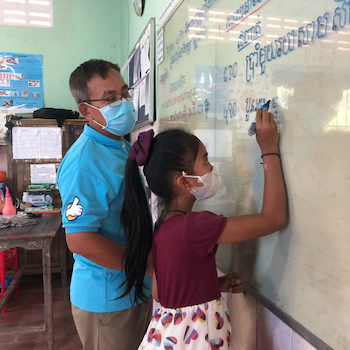
Non-Formal Education: What is it and why is it important?
Cambodian Context
Access to education is a right, not a privilege. We know that a person’s level of education has a direct impact on the opportunities they will be afforded in life. According to child experts, children who drop out of school and begin making money are highly unlikely to re-enrol in school later 1. Therefore, it is extremely important to get children enrolled in school as young as possible to instil good learning habits early. More than 5,000 15-year-old Cambodian students were interviewed in December 2017 and almost 98% reported that doing well in school was important and would lead to better jobs in the future 2. The will to learn is there, however, the infrastructure and the support system for vulnerable children is still a work in progress.
Cambodia has made great strides in education in recent years. The education system was all but destroyed during the 1970s but today, the government estimates that nationwide, primary schools have a 97% enrolment rate. However, the system is still in relatively nascent stages of development and there are large swaths of the population being left behind in their education.
While public primary school tuition is free, families still have to pay for school supplies and uniforms, and most have to arrange the transportation of their children to and from school every day. For many working families, this is not feasible and these children are the most vulnerable to falling behind in their studies. Irregular attendance or having to drop out and work to help support their family increase their risk of exploitation.
Why NFE?
Government efforts to reverse this trend have increased tremendously in recent years but there are still gaps to be filled. It is because of these gaps that Damnok Toek established its Non-Formal Education (NFE) program. This program aims to provide access to education for vulnerable children who are from the community, street-living, street-working, victims of trafficking or are residing in the Reception Centre.
Many of these children are unable to enter the public school system due to having limited to no previous schooling. This puts these children at an even greater disadvantage as it can be very difficult to catch up to their peers, which further increases the risk of them dropping out. Therefore, holistic strategies are used, which target a wide range of root causes to provide education and reintegrate marginalised children into public school in order to reduce the drop-out rate among this population. The NFE project uses creative, child-focused, and both non-formal and formal educational methodologies to support the children to continue their education.
A New Way Forward
To reach these vulnerable children, Damnok Toek staff host community awareness sessions where families are invited to come and learn about the program. It was through these sessions that Tola and Sreyya first discovered Damnok Toek.
“This was the first time that I got free food and information on how to get school materials and a uniform provided to me,” Tola says about the International Children’s Day event he attended where he learned about the NFE project. “My mum brought me to register at Damnok Toek because I didn’t want to stay at home, I wanted to study with my friends. I knew that studying is not easy but I wanted to study so I could get a good job in the future and not be poor.”
Upon registering for the project, children are tested to evaluate their literacy and numeracy levels to determine their grade equivalency. Once in class, children will learn subjects based on the Cambodian school curriculum including, Khmer language, mathematics, science, history, Khmer customs and morality, natural sciences, geography, sports education, and arts. NFE also teaches life skills including hygiene, health, reproductive health, children’s rights, critical thinking, and problem-solving.
A case manager is assigned to each student to provide psycho-social support, assist with health care and hygiene, and provide the student with a nutritious meal every day at the centre. Once children are ready, they are supported in the reintegration process into the public school system. From there students receive continued support from Damnok Toek to ensure they are registered properly and have uniforms, books, stationery and study materials. Social workers are a key component of this project. Their roles extend to conducting follow-ups with reintegrated cases while also providing counselling for children and their families if required.
Of the program, Sreyya says, “If I didn’t have Damnok Toek, my mother would have brought me to work and earn money in Thailand. Now, I am in grade 6 and hope Damnok Toek will continue to support me in secondary school. After, then I can find a good job and help my family.”